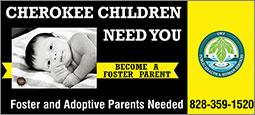
T he Family Safety Program offers child and adult protective services to the children and families in our Cherokee community. We work jointly with programs such as Analenisgi, Safe Babies, Transitional Housing, and other local Cherokee resources through services in the home and community.
We are instilling our Cherokee culture, beliefs, and traditions in our every day practice with our families to promote the preservation of Cherokee culture. Keeping our families together is our number one priority.

FOSTER CARE
Our foster parents will provide a safe environment for our children while their families get back on their feet. Foster parents will be licensed and trained through our program and will receive support from the program and foster parents.
Foster care applications are available and accepted at the Family Safety office.
For more information about becoming a Foster Parent, call Jessica Mitchell (828)-359-1565 or Nicolas Squirrell (828)-359-1563.
CLOTHING AVAILABLE
We have an abundance of gently used clothes FREE to anyone who can use them. Clothing sizes available are adults, children, and babies. All in good condition. Clothing is available for pick up Monday – Friday from 7:45 am – 4:30 pm.

FOR MORE INFORMATION
INDIAN CHILD WELFARE ACT OF 1978
The Indian Child Welfare Act (ICWA) is a federal law that seeks to keep American Indian children with American Indian families. Congress passed ICWA in 1978 in response to the alarmingly high number of Indian children being removed from their homes by both public and private agencies. The intent of Congress under ICWA was to “protect the best interests of Indian children and to promote the stability and security of Indian tribes and families” (25 U.S.C. § 1902). ICWA sets federal requirements that apply to state child custody proceedings involving an Indian child who is a member of or eligible for membership in a federally recognized tribe. ICWA is an integral policy framework on which tribal child welfare programs rely. It provides a structure and requirements for how public and private child welfare agencies and state courts view and conduct their work to serve tribal children and families. It also acknowledges and promotes the role that tribal governments play in supporting tribal families, both on and off tribal lands. However, as is the case with many laws, proper implementation of ICWA requires vigilance, resources, and advocacy. Learn more
For more information about ICWA, please contact ICWA Supervisory Jenny Bean (828)-359-6149 or ICWA Social Worker Melody Turner (828)-359-1506.